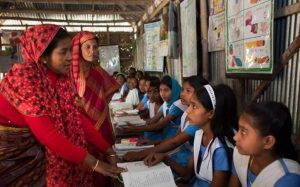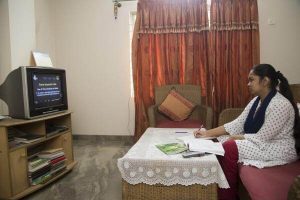We have a huge number of internet users in Bangladesh. But for online classes, one needs to have a laptop as well for active attending of classes. How many students have both the cell and the computer in Bangladesh? The digital divide is sharp, rues Tabassum, exclusively for Different Truths.
 “The philosophy of the schoolroom in one generation will be the philosophy of government in the next.” ~ Abraham Lincoln
“The philosophy of the schoolroom in one generation will be the philosophy of government in the next.” ~ Abraham Lincoln
The number of Covid-19 cases across the country is rising exponentially day by day. The longer the crisis continues, the worse it is going to impact the economy. Until now, it has been estimated that it would make a difference of $ 8.5 trillion on the world economy over the next two years due to the crisis. More than 34 million people across the globe would be pushed into extreme turmoil because of the pandemic.
A vast sector, which has been impacted by significantly by it is the education sector. Online classes have commenced in some places, and some exams have been already postponed. Parents are demanding that private schools should not take 100% tuition fees.
A vast sector, which has been impacted by significantly by it is the education sector. Online classes have commenced in some places, and some exams have been already postponed. Parents are demanding that private schools should not take 100% tuition fees. Schools, on the other hand, say that they do not have money to pay the staff and teachers.
As of June 28, 2020, the data of UNESCO has revealed that there have been nationwide closures of schools and colleges in more than 114 countries all over the world. It has affected more than one billion students. There were very few countries in the world where the schools were not shut down. For example, Australia, Sweden and Greenland. In the context of Bangladesh, all schools stopped teaching while others restored to online classes.
As of June 28, 2020, the data of UNESCO has revealed that there have been nationwide closures of schools and colleges in more than 114 countries all over the world. It has affected more than one billion students. There were very few countries in the world where the schools were not shut down.
Four crore students from primary to University level have been affected. All

education institutions are closed since March 17, 2020. For people like us, online classes are a great solution in the short run. But it also creates a digital divide. It is alright for people like us, who we can watch YouTube and can avail the availability of the internet. But what about the people that do not have internet available to them?
We have a huge number of internet users in Bangladesh. But for online classes, one needs to have a laptop as well for active attending of classes? How many students have both the cell and the computer in Bangladesh? The problem further exacerbates when you realise that several families out of these run their day to day affairs through the daily earnings. They have lost their livelihood after the pandemic outbreak.
So many people have pushed into poverty. Think about what such families would do. Neither would they have money to send their children to school, nor would they want their children to go to school because they want them to work to bring some cash.
So many people have pushed into poverty. Think about what such families would do. Neither would they have money to send their children to school, nor would they want their children to go to school because they want them to work to bring some cash. In regular times, children drop out of school. The top two reasons behind this are -Financial constraints in their families and economic work.
These two reasons would be applicable in the post-COVID-19 situation as well. This means when the schools reopen, the children in families like ours would go back to school, but the children in families like these will not go back to school. They would be pushed into child labour. These children are lagging in studies due to the digital divide. This is a long-term problem that would be created.
Bangladesh Television has taken the initiative for online classes for Bangla medium schools. How many children in rural areas are taking these classes when their parents’ concern is to stay alive? A considerable part of North Bengal and in the middle part of the country is facing the worst flood in the thirty years. In these areas, television or internet access is not accessible.

There are Bangla and English medium schools, government and private schools. Bangladesh Television has taken the initiative for online classes for Bangla medium schools. How many children in rural areas are taking these classes when their parents’ concern is to stay alive? A considerable part of North Bengal and in the middle part of the country is facing the worst flood in the thirty years. In these areas, television or internet access is not accessible.
Apart from that, even some children in rural areas do have both cell and laptop access; they cannot afford to pay the online charges. We hope that things will go back to normal once again. We do not know for how long? But in the meantime, the online classes will continue in the urban and for the privileged ones. Students are already sheathing behind as far as online classes are concerned.
And there are reasons for many to not to go back to schools after schools are opened for economic restraints. There has been an inequality created already due to the digital divide. However, the government is not responsible for this unexpected situation. But there should be planning to make a balance between the students of the two groups of the digital divide
And there are reasons for many to not to go back to schools after schools are opened for economic restraints. There has been an inequality created already due to the digital divide. However, the government is not responsible for this unexpected situation. But there should be planning to make a balance between the students of the two groups of the digital divide — the online privileged ones and the online deprived ones.
Otherwise, in the long run, we might find ourselves in a situation not suitable to go forward with the world’s fast-growing economy. And most importantly, we might see a major inequality in the educational system which is not acceptable for the future of the country.
Reference for Data:
Bad Effect on Education Due to Coronavirus Lockdown?
Published by myuniquetalk on July 9, 2020
Photo from the Internet





 By
By
 By
By
 By
By